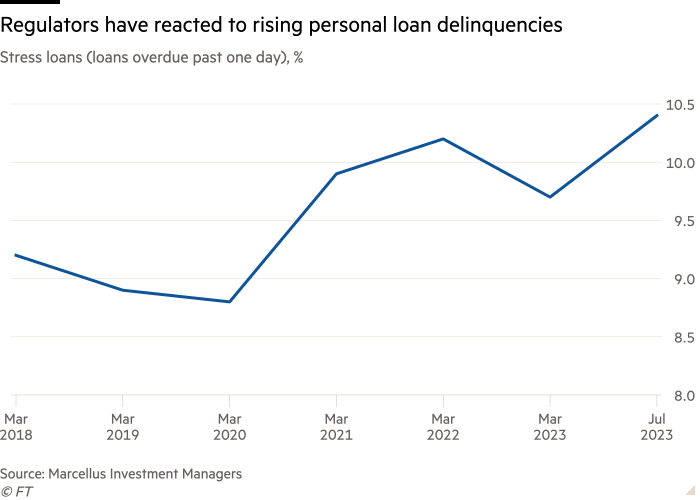India’s central bank has moved to curb growing tension in the booming market for unsecured consumer loans, hurting fintech lenders like Paytm that have been increasingly relying on riskier borrowing for growth.
The Reserve Bank of India announced in November that lenders had to increase the risk weight, the minimum amount of capital they must maintain in relation to assets, for personal loans from 100 per cent to 125 per cent after data showed the share of late payments. . She was shining.
The measure is intended to avert higher consumer debt and delinquencies by raising the cost of capital and slowing growth for companies that in recent years have turned to subprime credit cards or retail lending for larger profit margins. Reserve Bank of India Governor Shaktikanta Das warned banks to avoid “all forms of exuberance” after the restrictions were imposed.
Since then, shares of Paytm, one of India’s largest fintech groups with a market capitalization of 384 billion rupees ($4.6 billion), have fallen more than 30 percent, with Warren Buffett’s Berkshire Hathaway selling its 2.5 percent stake. In the company shortly after the crisis. Reserve Bank of India order. Last week, SoftBank-backed Paytm announced that it would cut small loans below Rs 50 lakh.
Smaller fintech lenders face an uncertain future. Another group, Zestmoney, which offered unsecured personal loans and was already struggling before the RBI’s announcement, has been shut down, according to media reports and a person familiar with the matter. Zestmoney did not respond to a request for comment.
“There have been a lot of players sprawling out trying to provide lending in the Indian digital market,” said Piyush Dalmiya, a senior partner at McKinsey, warning that regulation would force some companies to fold. “The more serious people who were very focused on profitability, very focused on risk, will start to benefit.”

Unsecured loans have emerged as a big growth area for businesses in India, the world’s most populous country with 1.4 billion people, thanks to strong economic growth in the wake of the coronavirus pandemic. Sophisticated digital infrastructure and loose regulation have led to a boom in online lenders offering loans at interest rates starting in the low double digits.
Fintech companies and non-bank financial lenders have emerged to meet the needs of millions of Indians who have joined the country’s credit-starved middle class – many of whom have traditionally had limited access to the formal financial system – and are looking to buy everything from refrigerators to holidays.
Banks also expanded into personal lending. Unsecured credit card loans from banks grew nearly 30 percent year-over-year between April and September, according to Fitch Ratings, compared with total loan growth of 20 percent.
This competition has forced lenders to turn to riskier areas, such as microfinance in rural areas, according to Fitch Director Siddharth Goel. “Everyone was trying to jump on the bandwagon and trying to lend, lend, lend,” he said. “There was a lot of stock chasing because everyone thought this was the right place.”
But early signs that credit quality was beginning to deteriorate among consumers prompted the Reserve Bank of India to intervene. The rate of personal loans delinquent by at least one day, which has been rising steadily in recent years, was 10.4 per cent in July this year, up from 8.9 per cent in March 2019, according to Marcellus Investment Managers in Mumbai. .

Bajaj Finance, one of India’s largest non-banking financial companies, said last October that it had reduced microlending due to signs that consumer borrowing was becoming “more reckless”.
Reserve Bank of India regulations will now require lenders to allocate a greater portion of capital to the consumer loans and credit card loans they offer, limiting the amount of money available for lending and increasing competition for loans.
“India is a credit-starved country, and we are a consumption-driven country,” said Shailesh Dixit, co-founder of Growmore Finance, which provides business loans to companies and individuals. “Lenders have to look at this more wisely…the cost of capital will go up.”
This is likely to drive up costs across the industry, said Hardika Shah, founder of Kinara Capital, a non-banking financial company that offers unsecured business loans.
“The impact could be a liquidity crisis because people are rethinking,” she said. The RBI’s announcement was like a hammer coming down immediately. So obviously they must feel that the risk is high enough to take this kind of action so quickly.
Digital lenders, which often served as conduits between financial institutions and consumers, were particularly vulnerable, analysts said. Companies like Paytm, one of India’s oldest fintech groups, have built user bases of hundreds of millions of customers through the rapid growth of cheap digital payments but have struggled to monetize their platforms.
Paytm, which expanded into personal and business lending over three years ago, announced last week that it will now prioritize higher value loans. The company said personal loans of less than Rs 50 lakh have become “very slim” at 5 per cent of its lending portfolio or less, compared to about 10 per cent earlier.
But Tej Shah, portfolio manager at Marcellus, warned that the Reserve Bank of India’s announcement and a slowdown in consumer lending will make it more difficult for many fintech companies.
“They have some customers, but they don’t have a real business model or know how to monetize that,” he said, adding that banks are better positioned to raise more capital.
“Clearly the most sustainable model is the banking model. They have been doing it for a long time, the way it should be done under the regulatory lens. The banks will win.”

“Typical beer advocate. Future teen idol. Unapologetic tv practitioner. Music trailblazer.”







More Stories
JPMorgan expects the Fed to cut its benchmark interest rate by 100 basis points this year
NVDA Shares Drop After Earnings Beat Estimates
Shares of AI chip giant Nvidia fall despite record $30 billion in sales